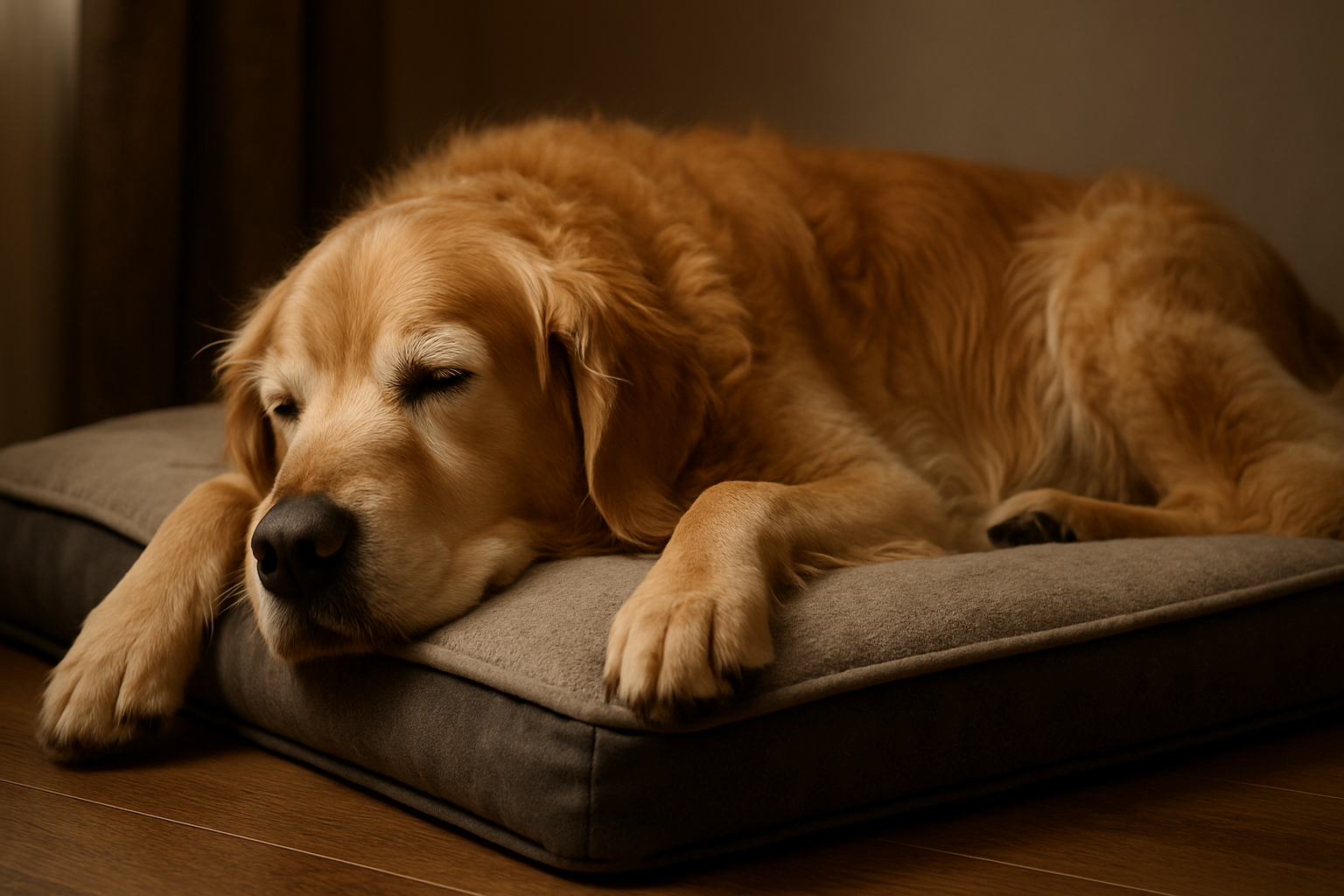Sleep patterns undergo significant changes as Golden Retrievers enter their senior years, with most dogs over seven years old experiencing alterations in sleep duration, quality, and timing that directly impact their overall health and well-being. Understanding these changes and establishing appropriate sleep routines becomes crucial for maintaining comfort, supporting cognitive function, and ensuring the restorative rest that aging bodies require. Senior Golden Retrievers typically need more sleep than their younger counterparts, often requiring 16-18 hours of rest daily compared to the 12-14 hours needed by adult dogs.
The importance of quality sleep for senior Golden Retrievers extends far beyond simple rest. During sleep, the body performs critical maintenance functions including tissue repair, memory consolidation, immune system strengthening, and toxin removal from the brain. Age-related changes in sleep architecture can affect these vital processes, making it essential for owners to understand how to optimize sleep environments and routines to support their aging companions’ changing needs.
Golden Retrievers, known for their adaptable and gentle nature, often mask sleep difficulties or discomfort, making it challenging for owners to recognize when sleep problems develop. Changes in sleep patterns may indicate underlying health issues, pain, cognitive decline, or environmental factors that require attention. By establishing ideal sleep routines and monitoring sleep quality, owners can significantly impact their senior Golden Retriever’s quality of life, comfort, and overall health outcomes.
Understanding Senior Canine Sleep Physiology
Age-Related Sleep Changes
Senior Golden Retrievers experience numerous physiological changes that affect their sleep patterns, quality, and requirements. These modifications begin gradually around age seven and become more pronounced with advancing years.
Sleep Architecture Modifications: Aging affects the structure of sleep cycles, with senior dogs spending less time in deep, restorative sleep phases and more time in lighter sleep stages. This change means they may sleep longer overall but experience less refreshing rest, leading to increased daytime fatigue and more frequent napping.
Circadian Rhythm Disruptions: The internal biological clock that regulates sleep-wake cycles can become less precise with age, leading to earlier bedtimes, earlier wake times, or fragmented sleep patterns. Some senior Golden Retrievers may experience “sundowning,” becoming more restless or anxious in the evening hours.
Temperature Regulation Changes: Aging affects the body’s ability to regulate temperature during sleep. Senior Golden Retrievers may become more sensitive to environmental temperatures, requiring warmer sleeping areas in cold weather or cooler spaces during hot periods.
Hormonal Influences: Changes in hormone production, including decreased melatonin levels, can affect sleep quality and timing in senior dogs. These hormonal shifts may contribute to increased nighttime restlessness or difficulty maintaining sleep throughout the night.
Sleep Requirements by Age Group
| Age Group | Daily Sleep Hours | Sleep Characteristics | Common Issues | Environmental Needs |
|---|---|---|---|---|
| 7-9 years | 14-16 hours | Slightly increased napping | Mild stiffness upon waking | Comfortable bedding |
| 9-12 years | 16-18 hours | More fragmented sleep | Joint pain, frequent position changes | Orthopedic support |
| 12+ years | 18-20 hours | Very light sleep, frequent waking | Cognitive changes, anxiety | Consistent routine |
| Senior with health issues | 20+ hours | Interrupted by discomfort | Pain, medication effects | Medical management |
Factors Affecting Senior Sleep Quality
Pain and Discomfort: Arthritis, hip dysplasia, and other age-related conditions can significantly impact sleep quality. Dogs experiencing joint pain may have difficulty finding comfortable positions, wake frequently during the night, or show reluctance to lie down for extended periods.
Cognitive Changes: Canine cognitive dysfunction can disrupt normal sleep patterns, causing confusion about day and night cycles, increased anxiety during evening hours, or restless behavior that interferes with quality rest.
Medication Effects: Many medications commonly prescribed for senior dogs can affect sleep patterns. Some may cause drowsiness, while others might increase alertness or cause frequent urination that disrupts sleep continuity.
Environmental Sensitivities: Senior Golden Retrievers may become more sensitive to environmental factors such as noise, light, temperature fluctuations, or changes in household routines that previously didn’t affect their sleep.
Creating the Optimal Sleep Environment
Bedding Selection and Placement
The foundation of good sleep for senior Golden Retrievers begins with appropriate bedding that supports aging joints while providing comfort and security.
Orthopedic Bed Features: High-quality orthopedic beds with memory foam or other supportive materials help distribute weight evenly and reduce pressure points on arthritic joints. Look for beds that maintain their shape over time and provide adequate thickness for your dog’s size and weight.
Size Considerations: Senior Golden Retrievers benefit from beds that allow them to stretch out fully while also providing enough space to change positions comfortably. However, some dogs prefer slightly smaller spaces that provide a sense of security.
Temperature Regulation: Choose bedding materials that help regulate body temperature. Cooling gel inserts can benefit dogs who tend to overheat, while heated beds or warming pads may help those who get cold easily or have arthritis that worsens in cool conditions.
Easy Access Design: Beds with low sides or ramp access help senior dogs with mobility issues get in and out comfortably. Avoid beds with high sides that require jumping or climbing, which may discourage use or cause injury.
Location Optimization
Quiet Zones: Position sleeping areas away from high-traffic areas, loud appliances, or external noise sources that might disturb rest. Senior dogs often become more sensitive to sounds that previously didn’t bother them.
Temperature Control: Choose locations with stable temperatures, away from drafts, direct sunlight, or heating/cooling vents that might cause temperature fluctuations during sleep periods.
Accessibility: Ensure sleeping areas are easily accessible without requiring navigation of stairs, slippery surfaces, or obstacles that might be challenging for dogs with mobility limitations.
Multiple Options: Provide several comfortable sleeping spots throughout the home so senior dogs can choose locations based on their current comfort needs, temperature preferences, or desire for social interaction.
| Sleep Environment Factors | Optimal Conditions | Common Problems | Solutions |
|---|---|---|---|
| Temperature | 65-72°F (18-22°C) | Too hot/cold, fluctuations | Heating pads, cooling mats, stable location |
| Lighting | Dim, consistent | Bright lights, sudden changes | Blackout curtains, night lights |
| Noise Level | Quiet, minimal disruption | Household noise, outside sounds | Sound dampening, white noise |
| Surface | Supportive, comfortable | Hard floors, worn bedding | Orthopedic beds, multiple cushions |
| Location | Accessible, secure | Stairs, isolated areas | Ground level, family proximity |
Establishing Healthy Sleep Routines
Pre-Sleep Rituals
Consistent pre-sleep routines help signal to senior Golden Retrievers that bedtime is approaching, supporting their natural circadian rhythms and reducing anxiety about sleep time.
Evening Exercise: Gentle exercise 2-3 hours before bedtime can help tire senior dogs appropriately without overstimulating them close to sleep time. A leisurely walk or light play session can promote better sleep quality.
Feeding Schedule: Complete evening meals at least 2-3 hours before bedtime to allow for proper digestion and reduce the likelihood of nighttime bathroom needs. However, a small bedtime snack may help some dogs sleep more soundly.
Bathroom Routine: Establish a consistent final bathroom break routine to minimize nighttime interruptions. This is particularly important for senior dogs who may have reduced bladder control or take medications that increase urination.
Calming Activities: Incorporate relaxing activities such as gentle brushing, massage, or quiet interaction to help senior dogs transition from daytime activity to nighttime rest.
Sleep Schedule Management
Consistent Timing: Maintain regular bedtime and wake-up times to support natural circadian rhythms. Senior dogs benefit from predictable schedules that help regulate their internal clocks.
Nap Management: While senior dogs need more sleep overall, excessive daytime napping can interfere with nighttime rest. Encourage appropriate napping while maintaining nighttime sleep priority.
Gradual Adjustments: When changes to sleep schedules are necessary, implement them gradually over several days to allow senior dogs time to adjust without causing stress or confusion.
Seasonal Adaptations: Adjust sleep routines seasonally to account for changes in daylight hours, temperature, and activity levels that naturally occur throughout the year.
Managing Common Senior Sleep Challenges
Nighttime Restlessness
Many senior Golden Retrievers experience increased restlessness during nighttime hours, which can disrupt both their sleep and their family’s rest.
Pain-Related Restlessness: Dogs experiencing joint pain or other discomfort may have difficulty settling into comfortable positions for sleep. This often manifests as frequent position changes, getting up and lying down repeatedly, or vocalizations during the night.
Cognitive-Related Restlessness: Canine cognitive dysfunction can cause confusion about day and night cycles, leading to increased activity during nighttime hours. Dogs may pace, vocalize, or seek attention when they should be sleeping.
Anxiety-Induced Restlessness: Some senior dogs develop anxiety around bedtime or during nighttime hours, possibly related to decreased sensory function, cognitive changes, or separation concerns.
Sleep Disruption Solutions
| Sleep Challenge | Symptoms | Potential Causes | Management Strategies |
|---|---|---|---|
| Frequent Waking | Multiple wake-ups, difficulty returning to sleep | Pain, bathroom needs, anxiety | Pain management, scheduled breaks, comfort measures |
| Early Rising | Waking before dawn, restlessness | Circadian rhythm changes, discomfort | Light therapy, routine adjustment, medical evaluation |
| Excessive Napping | Long daytime sleeps, nighttime alertness | Boredom, underlying illness | Activity increase, medical check-up, schedule modification |
| Sleep Walking | Wandering at night, disorientation | Cognitive dysfunction, confusion | Safety measures, veterinary consultation, medication |
| Vocalization | Whining, barking during sleep hours | Pain, anxiety, cognitive changes | Comfort measures, medical evaluation, behavioral support |
Medical Interventions
Pain Management: Effective pain control is crucial for quality sleep in senior Golden Retrievers. This may include prescription medications, supplements, or alternative therapies that reduce discomfort and allow for more restful sleep.
Sleep Aids: In some cases, veterinarians may prescribe sleep aids or anxiety medications to help senior dogs achieve better sleep quality. These should only be used under professional guidance and monitoring.
Hormone Therapy: Melatonin supplements may help regulate sleep-wake cycles in some senior dogs, particularly those experiencing circadian rhythm disruptions. Dosing should be determined by a veterinarian.
Underlying Condition Treatment: Addressing underlying health conditions such as cognitive dysfunction, heart disease, or endocrine disorders can significantly improve sleep quality in senior Golden Retrievers.
Monitoring Sleep Quality and Health
Sleep Assessment Indicators
Regular monitoring of sleep patterns and quality helps identify changes that may indicate health issues or the need for routine adjustments.
Sleep Duration Tracking: Monitor total daily sleep time, including nighttime sleep and daytime naps. Sudden increases or decreases in sleep duration may indicate health changes requiring veterinary attention.
Sleep Quality Observations: Note the depth of sleep, frequency of position changes, and ease of waking. Quality sleep should be relatively undisturbed, with dogs appearing refreshed upon waking.
Behavioral Changes: Watch for changes in sleep-related behaviors such as difficulty settling, increased restlessness, or new sleep locations that might indicate discomfort or health issues.
Physical Symptoms: Monitor for physical signs that might affect sleep, including stiffness upon waking, difficulty getting comfortable, or signs of pain during position changes.
When to Consult Veterinarians
Sudden Sleep Pattern Changes: Dramatic changes in sleep duration, timing, or quality warrant veterinary evaluation to rule out underlying health issues.
Signs of Discomfort: Obvious signs of pain, difficulty getting comfortable, or vocalizations during sleep should prompt professional assessment.
Cognitive Symptoms: Confusion, disorientation, or significant behavioral changes during sleep hours may indicate cognitive dysfunction requiring medical intervention.
Impact on Quality of Life: When sleep issues significantly affect a dog’s daytime behavior, appetite, or overall well-being, professional guidance is essential.
Nutritional Support for Better Sleep
Sleep-Supporting Nutrients
Certain nutrients can support better sleep quality in senior Golden Retrievers when incorporated into their diet or given as supplements.
Tryptophan: This amino acid precursor to serotonin can promote relaxation and better sleep quality. Natural sources include turkey, eggs, and some commercial senior dog foods formulated with sleep support in mind.
Magnesium: This mineral supports muscle relaxation and nervous system function, potentially improving sleep quality in senior dogs. However, supplementation should be done under veterinary guidance.
Omega-3 Fatty Acids: These essential fats support brain health and may help regulate sleep patterns while reducing inflammation that could interfere with comfortable rest.
B-Complex Vitamins: These vitamins support nervous system function and may help regulate sleep-wake cycles in senior dogs experiencing circadian rhythm disruptions.
Feeding Timing and Sleep
Evening Meal Timing: Complete dinner 3-4 hours before bedtime to allow for proper digestion and reduce the likelihood of nighttime bathroom needs or digestive discomfort.
Bedtime Snacks: Small, easily digestible snacks containing tryptophan or complex carbohydrates may help some senior dogs sleep better. However, avoid large amounts of food close to bedtime.
Hydration Balance: Ensure adequate daytime hydration while managing evening water intake to minimize nighttime bathroom interruptions.
Environmental Modifications for Better Sleep
Lighting Management
Proper lighting control can significantly impact sleep quality for senior Golden Retrievers, particularly those experiencing circadian rhythm disruptions.
Natural Light Exposure: Ensure adequate exposure to natural daylight during daytime hours to help maintain healthy circadian rhythms. This is particularly important for dogs spending most of their time indoors.
Evening Light Reduction: Gradually reduce lighting levels in the evening to signal approaching bedtime. Avoid bright lights or screens near sleeping areas during nighttime hours.
Night Navigation: Provide subtle night lighting for senior dogs who may need to navigate to bathroom areas during the night, but avoid bright lights that might disrupt sleep cycles.
Sound Management
White Noise: Consistent background noise can mask sudden sounds that might wake senior dogs who have become more sensitive to environmental disturbances.
Sound Dampening: Use soft furnishings, carpets, or sound-absorbing materials to reduce noise levels in sleeping areas.
Household Noise Control: Minimize loud activities, television volume, or other household noises during senior dogs’ sleep hours.
Exercise and Activity Balance
Daytime Activity Requirements
Appropriate daytime activity levels support better nighttime sleep quality in senior Golden Retrievers while avoiding overexertion that might cause discomfort.
Gentle Exercise: Regular, moderate exercise such as leisurely walks or swimming helps maintain physical fitness and promotes better sleep quality without overstressing aging joints.
Mental Stimulation: Cognitive activities such as puzzle toys, training sessions, or scent work provide mental exercise that can contribute to more restful sleep.
Social Interaction: Appropriate social activities with family members or other pets can provide stimulation and satisfaction that supports better rest.
Activity Timing Considerations
Morning Activity: Encourage more active periods during morning hours when senior dogs typically have more energy and mobility.
Afternoon Rest: Allow for natural afternoon rest periods without forcing activity during times when senior dogs naturally prefer to nap.
Evening Wind-Down: Gradually reduce activity levels in the evening hours to help senior dogs transition toward bedtime.
Creating Long-Term Sleep Success
Routine Flexibility
While consistency is important for senior Golden Retrievers, routines must also be flexible enough to accommodate changing health needs and circumstances.
Health-Based Adjustments: Modify sleep routines as needed to accommodate new health conditions, medications, or mobility changes that affect sleep requirements.
Seasonal Adaptations: Adjust routines seasonally to account for changes in daylight, temperature, and activity levels that naturally occur throughout the year.
Life Stage Transitions: Recognize that sleep needs may continue to evolve as dogs progress through different stages of their senior years.
Family Coordination
Household Schedule Alignment: Coordinate family activities and schedules to support senior dogs’ sleep routines without causing disruption or stress.
Caregiver Communication: Ensure all family members understand the importance of maintaining consistent sleep routines and environmental conditions for senior dogs.
Visitor Management: Plan for maintaining sleep routines even when household routines are disrupted by visitors or special events.
Supporting Peaceful Golden Years
Establishing and maintaining ideal sleep routines for elderly Golden Retrievers represents a fundamental aspect of senior care that significantly impacts overall quality of life, health, and happiness. The investment in creating optimal sleep environments, consistent routines, and appropriate monitoring pays dividends in improved comfort, better health outcomes, and enhanced well-being throughout their golden years.
The evolution from simple sleep accommodation to comprehensive sleep management reflects the deepening understanding of senior dogs’ complex needs and the commitment to providing the highest quality care during this precious phase of life. Each comfortable night’s sleep, each peaceful nap, and each restful moment contributes to the overall health and happiness that allows senior Golden Retrievers to age with dignity and comfort.
Success in senior sleep management lies not in rigid adherence to perfect routines but in understanding individual needs, adapting to changing circumstances, and maintaining focus on comfort and quality of life. The goal extends beyond simply providing a place to sleep to creating an environment and routine that actively supports the restorative processes essential for healthy aging.
Your commitment to providing ideal sleep conditions for your senior Golden Retriever demonstrates profound understanding of their changing needs and dedication to their comfort and well-being. Through thoughtful attention to sleep quality, environmental optimization, and routine consistency, you ensure that your beloved companion’s golden years are filled with the peaceful rest essential for continued health, happiness, and the special bond that defines the relationship between Golden Retrievers and their devoted families.





Comments
Pingback: Psychology of Habit Formation for Golden Retrievers